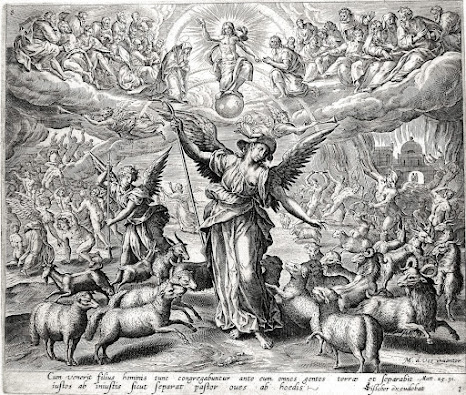"There was a rich man who dressed in purple garments and fine linen
and dined sumptuously each day.
And lying at his door was a poor man named Lazarus, covered with sores,
who would gladly have eaten his fill of the scraps
that fell from the rich man's table.
We have more in common with the affluence of the rich man than the adversity of poor Lazarus. One thing which we must refuse to share with the rich man is his indifference to the needy on his doorstep. Like the Good Samaritan we must be alert to those along our path whom we might help. We must not closes our eyes or are hearts to the needy even if their appearance is less wholesome or picturesque than we might desire. We probably have some criteria for when and when and how we will give assistance to others. And to some degree we must. But Jesus is inviting us to consider whether any of this criteria is self-serving, designed only to protect our comfort, and whether it might be broadened. Is there anyone over whom we step on our daily path, to whom we might be a benefit? Are we crossing the street on our journey to avoid situations where we might otherwise do some good? Far from a call to go to Africa or Calcutta to save the world the initial invitation is most often to see what we can do in the places we have been planted.
Blessed is the man who trusts in the LORD,
whose hope is the LORD.
He is like a tree planted beside the waters
that stretches out its roots to the stream:
It fears not the heat when it comes,
its leaves stay green;
In the year of drought it shows no distress,
but still bears fruit.
When our own lives are connected rooted in Jesus we will find ourselves able to give fruit and shade without fear. We won't need to worry about the condition which will eventually befall "the man who trusts in human beings", as did the rich man who eventually found himself "suffering torment in these flames".
Abraham replied, 'My child,
remember that you received what was good during your lifetime
while Lazarus likewise received what was bad;
but now he is comforted here, whereas you are tormented.
Closing in on ourselves in attempt to satisfy our desires has the unintended consequence of cutting us off from the source of life, which is always found outside, beyond the bounds of our selfish ego. This is why Jesus reminds us, "I am the vine; you are the branches. Whoever abides in me and I in him, he it is that bears much fruit, for apart from me you can do nothing" (see John 15:5).
The entirety of the Scriptures expresses God's love for the poor and marginalized. This ought not to catch us by surprise. May the privilege in which we have been blessed to live avail, not simply for fine dining and fancy robes, but for those for whom God has particular loving concern. Then we will find ourselves with something better than material wealth. We will be filled from the well of deep spiritual life flowing from the heart of Jesus himself.



_-_James_Tissot_-_overall.jpg)








.jpg)




